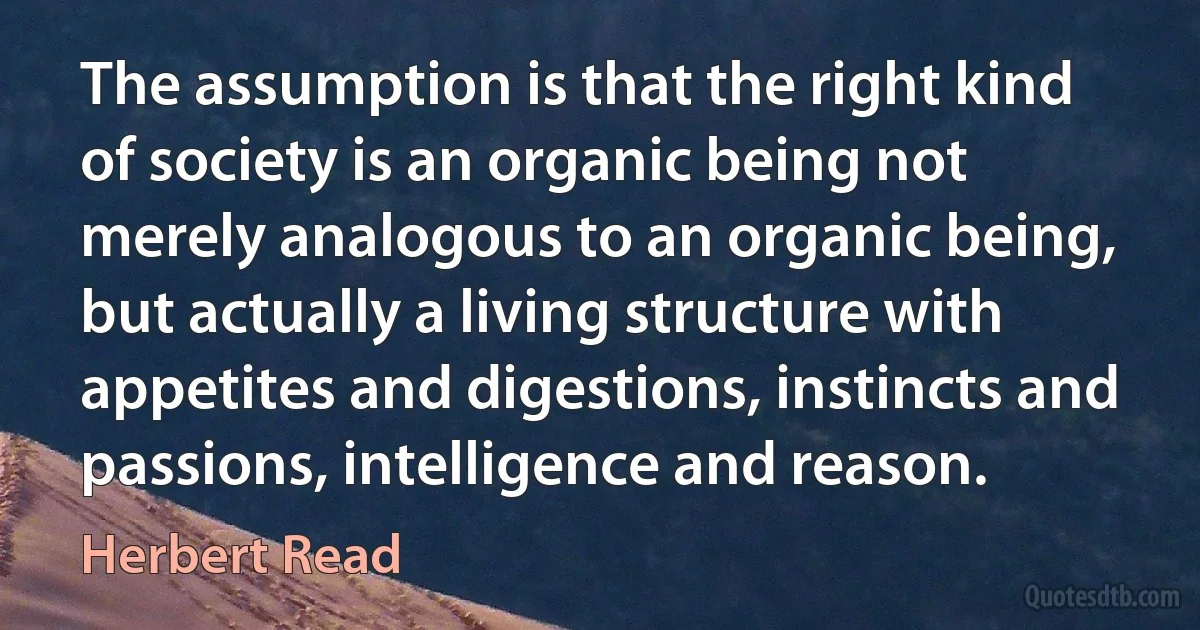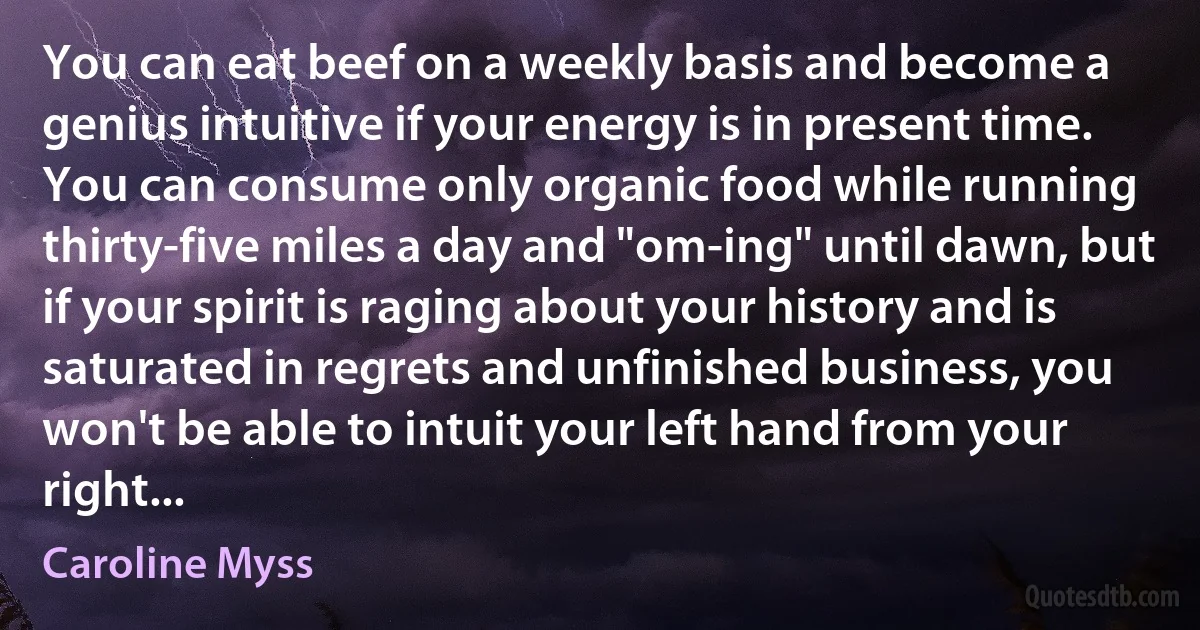Organic Quotes - page 8
The strongest use of the symbol is to be found in its magical power of doubling the actual universe, and placing by its side an ideal universe, its exact counterpart, with which it can be compared and contrasted, and, by means of curiously connecting fibres, form with it an organic whole, from which modern analysis has developed her surpassing geometry.

Benjamin Peirce
The European Union is not, in fact, a union at all, but a continent-wide political coup. What began as a common market has now metamorphosed by stealth into a supranational political dictatorship, a parasitical organism living on the backs of the European nation states, sucking their lifeblood and slowly killing them off; a bureaucratic tyranny that wants to "harmonize" out of existence the national identities that have made Europe a continent of genuine diversity and a cultural crucible whose values have shaped the entire western world. But they want to put a stop to all that in the European Union of Soviet Socialist Republics, and this is why European laws are never enacted in response to any kind of organic need in society, but as top-down directives intended to impose indiscriminate uniformity for its own sake.

Pat Condell
As opposed to [megatechnics], an organic system directs itself to qualitative richness, amplitude, spaciousness, free from quantitative pressure and crowding, since self-regulation, self-correction, and self-propulsion are as much an integral property of organisms as nutrition, reproduction, growth, and repair. Balance, wholeness, completeness, continuous interplay between inner and outer, the subjective and the objective aspects of existence are identifying characteristics of the organic model; and the general name for an economy based on such a model is an economy of plenitude.

Lewis Mumford
The recoil from the absolute of mechanism was into an equally sterile absolute of the organic: the raw primitive. The organic processes, reduced to shadows by the machine, made a violent effort to retrieve their position. The machine, which acerbically denied the flesh, was offset by the flesh, which denied the rational, the intelligent, the orderly processes of behavior that have entered into all man's cultural developments-even those developments that most closely derive from the organic. The spurious notion that mechanism had naught to learn from life was supplanted by the equally false notion that life had nothing to learn from mechanism.

Lewis Mumford
Through spontaneity we are re-formed into ourselves. It creates an explosion that for the moment frees us from handed-down frames of reference, memory choked with old facts and information and undigested theories and techniques of other people's findings. Spontaneity is the moment of personal freedom when we are faced with reality, and see it, explore it and act accordingly. In this reality the bits and pieces of ourselves function as an organic whole. It is the time of discovery, of experiencing, of creative expression.

Viola Spolin
The writers by whom, more than by any others, a new mode of political thinking was brought home to me, were those of the St. Simonian school in France. In 1829 and 1830 I became acquainted with some of their writings. They were then only in the earlier stages of their speculations. They had not yet dressed out their philosophy as a religion, nor had they organized their scheme of Socialism. They were just beginning to question the principle of hereditary property. I was by no means prepared to go with them even this length; but I was greatly struck with the connected view which they for the first time presented to me, of the natural order of human progress; and especially with their division of all history into organic periods and critical periods.

John Stuart Mill
Opponents of Fracastoro met his arguments by feigning imaginary causes, which differed from each other rather in name than in substance. Andrea Mattioli, for instance, an eminent botanist, the illustrator of Dioscorides, embraced the notion of Agricola, a German miner, that a certain 'materia pinguis' or 'fatty matter,' set into fermentation by heat, gave birth to fossil organic shapes. Yet Mattioli had come to the conclusion, from his own observations, that porous bodies, such as bones and shells, might be converted into stone, as being permeable to what he termed the 'lapidifying juice.

Charles Lyell
Quirini, in 1676, contended in opposition to Scilla, that the diluvian waters could not have conveyed heavy bodies to the summit of mountains, since the agitation of the sea never (as Boyle had demonstrated) extended to great depths, and still less could the testacea, as some pretended, have lived in these diluvian waters, for 'the duration of the flood was brief, and the heavy rains must have destroyed the saltness of the sea! He was the first writer who ventured to maintain that the universality of the Noachian cataclysm ought not to be insisted upon. ...Visionary as was this doctrine, it gained many proselytes even amongst the more sober reasoners of Italy and Germany, for it conceded both that fossil bodies were organic, and that the diluvial theory could not account for them.

Charles Lyell
Lamarck taught not only that species had been constantly undergoing changes from one geological period to another, but that there also had been a progressive advance of the organic world from the earliest to the latest times, from beings of the simplest to those of more and more complex structure and from the lowest instincts up to the highest, and, finally, from brute intelligence to the reasoning powers of Man. The improvement in the grade of being had been slow and continuous, and the human race itself was at length evolved out of the most highly organised and endowed of the inferior mammalia.

Charles Lyell
Scilla, a Sicilian painter, published in l670, a work on the fossils of Calabria, illustrated by good engravings. This was written in Latin, with great spirit and elegance, and it proves the continued ascendency of dogmas often refuted; for we find the wit and eloquence of the author chiefly directed against the obstinate incredulity of naturalists, as to the organic nature of fossil shells.

Charles Lyell
The Posthumous Works of Robert Hooke M. D.,'... appeared in 1705, containing 'A Discourse of Earthquakes'... His treatise... is the most philosophical production of that age, in regard to the causes of former changes in the organic and inorganic kingdoms of nature. 'However trivial a thing,' he says, 'a rotten shell may appear to some, yet these monuments of nature are more certain tokens of antiquity than coins or medals, since the best of those may be counterfeited or made by art and design, as may also books, manuscripts, and inscriptions, as all the learned are now sufficiently satisfied has often been actually practised,' &c.; 'and though it must be granted that it is very difficult to read them and to raise a chronology out of them, and to state the intervals of the time wherein such or such catastrophes and mutations have happened, yet it is not impossible.

Charles Lyell
A geologist should be well versed in chemistry, natural philosophy, mineralogy, zoology, comparative anatomy, botany; in short, in every science relating to organic and inorganic nature. ...But the brief duration of human life, and our limited powers, are so far from permitting us to aspire to such extensive acquisitions, that excellence even in one department is within the reach of few, and those individuals most effectually promote the general progress, who concentrate their thoughts on a limited portion of the field of inquiry.

Charles Lyell
In many ways art is similar to religion. Its development consists not in new discoveries which invalidate the old truths (as is obviously the case in science). Its development consists in sudden illuminations, similar to lightning, in explosions, which burst in the sky like fireworks.... this illumination shows with blinding light new perspectives, new truths, which are basically nothing but the organic development, the further organic growth of the earlier wisdom... Was the New Testament possible without the Old? Could our time, that of the threshold of the 'third' revelation, be thinkable without the second?

Wassily Kandinsky
Agriculture is the art of deriving from the earth the most valuable organic productions. He who exercises this art, seeks to obtain profit by causing to grow, and by using, its animal and vegetable productions. The more considerable the gain derived, therefore, the better is the object accomplished. The most perfect agriculture is, evidently, that which produces, by the application of labour, the largest and the most permanent profit in comparison with the means employed. Systematic agriculture ought, then, to teach us all the circumstances by means of which we may derive the most considerable profit by the practice of the art.

Albrecht Thaer
I consequently tried it in such cases, and where there has not been destruction, or irreparable organic injury to the auditory apparatus, I can confidently say, I know of no means equal to hypnotism, for benefiting such cases. Of course, it cannot suit all cases, but I am satisfied it will succeed in a numerous class of cases, and in some which bid defiance to all other known modes of treatment.

James Braid



